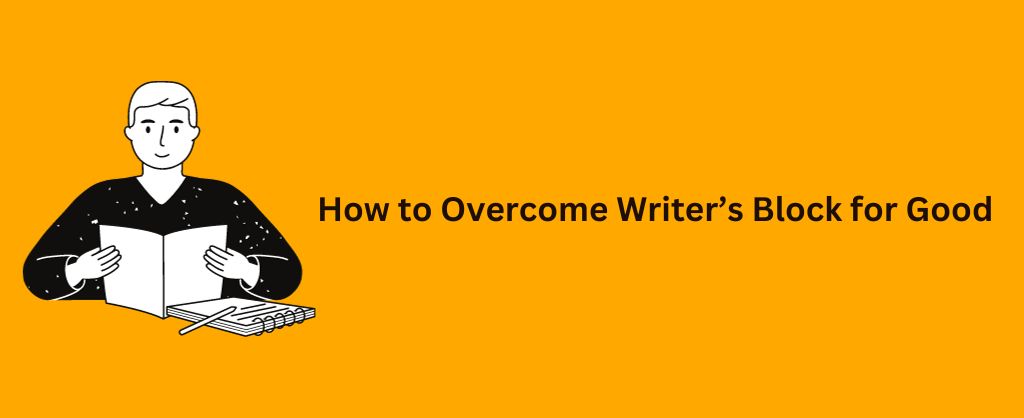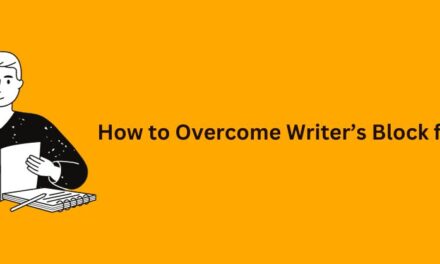A Comprehensive Guide to Overcoming Writer’s Block

Writer’s block. Those dreaded two words that can strike fear into the hearts of writers everywhere. That paralyzing feeling of staring at a blank page or blinking cursor, fingers poised over the keyboard, but no words coming out.
It happens to all of us at some point, from newbie writers to even the most prolific, highly accomplished authors. Writer’s block is the villain we must battle every time we sit down to write.
As a writer myself, I know the agony of wanting to write but feeling completely blocked from doing so all too well.
Content
- What Causes Writer’s Block?
- Signs You May Have Writer’s Block
- Strategies to Overcome Writer’s Block
In this comprehensive guide, we’ll thoroughly explore the causes of writer’s block, signs you may be experiencing it, and most importantly, an array of practical techniques to overcome it for good.
Take heart, fellow writers. While writer’s block can be incredibly frustrating and discouraging in the moment, it is a temporary state. If you arm yourself with an understanding of why it happens plus strategies to get unstuck, you can defeat the writer’s block beast.
What Causes Writer’s Block?
In order to overcome writer’s block, it helps to first understand some of the potential underlying causes. While it can feel very mysterious and nebulous when it strikes, writer’s block actually stems from a variety of understandable factors.
Let’s examine some of the most common culprits:
Perfectionism
The desire to write an A+ essay, story, or article can spur you onward, but it can also paralyze you from writing a single word. Perfectionism is a huge contributor to writer’s block.
If your inner critic makes you feel like nothing you write will ever be good enough or measure up to impossible standards, you may avoid writing altogether. This stems from linking your self-worth to your writing abilities.
In reality, no writer produces perfect work all of the time. Have compassion for yourself and remember that done is better than perfect.
Fear and Anxiety
Fear is a close cousin of perfectionism when it comes to blocking writers. You may be anxious that whatever you write just won’t be very good or well-received. Or you may worry about criticism from teachers, editors, or readers. Everyone deals with these insecurities, but they can definitely freeze you from making progress.
Highly imaginative minds can even dream up worst case scenarios of writing total embarrassments that tank careers. In reality, criticism and rejection are part of every writer’s journey. While never fun, they are manageable obstacles. Don’t let fear of the unknown paralyze your power to create.
Lack of Motivation
It’s hard to write when you’re feeling unmotivated and apathetic. You may feel you have no good ideas worth putting down or be unsure what to write about. Writer’s block can stem from lacking inspiration, purpose, or enthusiasm about your current project.
Without an inner drive to create, writing can feel like a chore. Times when you’re bored, depressed or going through a period of little passion make writer’s block more likely. Reigniting your spark helps get the creative juices flowing again.
Fatigue and Burnout
Mental or physical fatigue and burnout are surefire contributors to writer’s block. If your brain and body are utterly exhausted, it’s incredibly difficult to focus and concentrate on writing. Pushing through blocks while burnt out will only breed frustration.
Rest and recovery periods are essential for creative work. Make sure you are getting adequate sleep, taking breaks between writing sessions, and taking care of your overall health. Refreshed writers are productive writers.
Too Much Time Pressure
It may seem counterintuitive, but having too much pressure to write well in limited time often backfires. Unreasonable deadlines or forcing yourself to produce genius on command builds stress that blocks creativity.
Allow yourself adequate time for research, brainstorming, writing rough drafts, and editing. Don’t expect to write polished pieces in one frantic sitting. Granting yourself permission to take the time you need results in writing that flows more organically.
Life Stressors and Problems
Trying to write while simultaneously carrying heavy baggage from other areas of your life is a recipe for blocked writing. If your mental energy is consumed worrying about family issues, financial struggles, health problems, work stress or other unresolved troubles, your brain doesn’t have the bandwidth to focus on writing.
Don’t beat yourself up if external crises are temporarily impacting your creativity and productivity as a writer. Cut yourself some slack and address the non-writing issues sabotaging your mental space first.
Your Inner Critic
We all have an inner critic that inserts doubt, second-guessing and negative commentary as we write. Some writers have louder, more relentless critics than others. This overly critical voice serves up harsh judgments like “This writing is garbage” and “You have zero talent.”
Pay this cruel critic no mind. Understand it comes from internalized insecurity, not objective truth. Don’t let your inner critic’s mocking distortions block you from doing your work. You are enough.
Past Writing Traumas
For some writers, past traumatic experiences can trigger writer’s block in the present. Did you receive crushing criticism on old writing that devastated your confidence? Have predatory editors stolen and monetized your work without permission or payment?
Were you punished or shamed as a young student for what and how you wrote? Painful writing-related experiences earlier in life can come back to haunt you, making you hesitant to write again. Recognizing this possibility and working through lingering hurt helps break its paralyzing power.
In summation, the reasons we as writers struggle with blocked creativity and productivity vary widely. The cause could be as simple as lack of sleep. Or it may be complexly intertwined with past rejection or perfectionism.
By reflecting on what is halting your writing right now, you can start addressing that specific block cause. Healing the source will get your writing flowing freely again.
Signs You May Have Writer’s Block
How can you definitively diagnose a case of writer’s block versus normal writing struggles?
Here are some clear-cut signs and symptoms:
- Staring at an empty page or blinking cursor for long periods without writing anything
- Wasting excessive time trying to perfect one paragraph or sentence
- Difficulty focusing and concentrating while attempting to write
- Engaging in avoidance behaviors like suddenly cleaning your entire house to delay writing
- Writing something, then immediately deleting it in disgust
- Repeatedly starting projects over and over from scratch
- Endlessly writing and rewriting the same passage without making progress
- Experiencing an uncharacteristic lack of motivation or creativity
- Feeling heightened anxiety, dread, frustration or annoyance surrounding writing
If you are experiencing several of these symptoms, you are likely dealing with a bout of writer’s block. Of course, occasional struggles to write and lapses in inspiration are normal parts of the writing life. But if you recognize that a pervasive inability to get going or make headway signals a bigger issue for you, take it seriously.
Don’t write it off as simply being lazy or untalented. Acknowledge you are facing an obstacle, but it is temporary and within your power to overcome.
Strategies to Overcome Writer’s Block
Now that we’ve explored the causes and symptoms of writer’s block, let’s get to the good stuff: actionable strategies to get you back to productive writing.
Try incorporating some of these useful techniques:
Shift Your Mindset
Adjusting how you mentally frame writing challenges can make a huge difference. Check any perfectionistic or fear-based thinking at the door.
- Strive for progress, not perfection. Done is better than perfect.
- Detach your sense of self-worth from your writing abilities. You are enough regardless of what you produce.
- Give yourself full permission to write terribly. No one else has to read early drafts.
- View writer’s block as a temporary state, not an identity. It will pass.
- Focus on the excitement of creating versus worrying about critiques that haven’t happened.
- Be gently impatient with inner critic voices. Note their input, then carry on creating.
Improve Your Writing Process
Tweak your actual process and habits to get into a better writing flow.
- Make writing a regular daily habit versus waiting for rare inspiration.
- Change your environment – work somewhere new like a cafe or library.
- Switch modalities: handwrite instead of type or vice versa.
- Take mini breaks to move, stretch and refresh.
- Set a timer for short, focused writing bursts. Start with 15-30 minutes.
- Work first on the part you feel excited about versus chronological order.
- Celebrate small wins like finishing a paragraph or page. Progress adds up.
Get Unstuck With Prompts
If you’re totally blocked, leverage writing prompts to get unstuck.
- Jot down quick notes on any small ideas that strike you. Capture those sparks.
- Freewrite continuously without stopping. Avoid editing yourself.
- Give yourself permission to write the worst first draft ever. Just keep your fingers moving.
- Start with the easiest section instead of agonizing over introductions.
- Try writing from a radically different viewpoint than your own.
- Explore an old idea or piece that got scrapped. Mine it for gems.
- Step away from your normal genre and projects. Play with writing something new.
- Switch mediums and write by hand when stuck typing or vice versa.
Seek Support
Writing is often solitary, but you can combat block with community.
- Discuss your frustrations and options with a trusted writing mentor or buddy.
- Join a writing group for accountability, motivation and inspiration.
- Consider working with a writing coach to build your skills and confidence.
- Surround yourself with people who cheer you on through the messy process.
Quiet Your Inner Critic
Your inner critic’s constant commentary probably won’t disappear entirely. But you can learn to turn down the volume and limiting influence.
- Notice when your inner critic is being unreasonable, excessive or even abusive in criticism.
- Intentionally cultivate more encouraging self-talk and celebrate small wins.
- Imagine how you’d compassionately cheer on a struggling friend. Extend that same grace to yourself.
- Assess whether your perfectionistic standards are realistic or designed for failure.
- Consider if the source of criticism is wisdom versus insecurity or woundedness.
- Detach your self-worth from your inner critic’s skewed judgments.
Prioritize Self Care
Writing requires mental energy. Replenish yourself so you show up energized.
- Get adequate sleep, nutrition and physical activity. Reduce stress where possible.
- Take real breaks from writing as needed, especially when fatigued. It’s not a moral failing.
- Set boundaries and make time for hobbies, friends and family too. Seek balance.
- Address emotional struggles, past traumas or mental health issues with professional support.
- Incorporate relaxation practices like deep breathing, meditation, yoga or walks in nature.
To summarize, which strategies help you overcome writer’s block depends on your unique situation and root causes. But don’t lose hope!
With consistent effort using these tools, you can move through any blocking episode. Then suddenly one day, you find the words flowing freely once again. Take it one day at a time. Even small steps forward add up to big progress.












